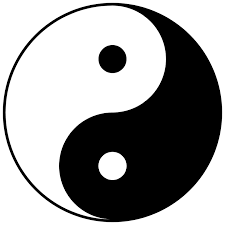On virtue…
Virtue is doing the right thing when nobody is looking.
It is the actualization of ones individual moral principles.
However, you often unintentionally ignore your moral compasses and veer into unethical behavior when possible consequences are intangible, rationalizing this mainly by convincing ourselves that everyone else behaves similarly. Simple awareness and acknowledgment of this proclivity to taking the ‘easy’ way instead of the ‘right’ way can mitigate this vulnerability.
Is there a moral difference between what we do and what we allow to happen when we could have acted differently?
Life is so much easier when you're not constantly looking over your shoulder because of the shady shit you're doing, invoking other peoples' anger and making yourself a target, and not getting wrapped up in the lies and bullshit games people play. It's much easier to be happier when you don't have all of that bullshit clogging up your brain.
It is giving a helping had without expectation of acknowledgement or reward, treating those that can do nothing for you magnanimously.
"Every man is guilty of all the good he did not do."
~ Voltaire
Listening to your heart and doing what feels right, not necessarily what feels good.
Deep down, below the surface of the average man's conscience, he hears a voice whispering: "There is something not right."
“Be more concerned with your character than your reputation, because your character is what you really are, while your reputation is merely what others think you are…the true test of a man's character is what he does when no one is watching.”
~ John Wooden
If virtue is doing what is right, that means it is a moral action hence a definition of virtue is ‘behavior showing high ethical or moral standards’. If morality is relative then must also virtue be subjective?
"If you accomplish something good with hard work, the labor passes quickly, but the good endures; if you do something shameful in pursuit of pleasure, the pleasure passes quickly, but the shame endures"
~ Gaius Musonius Rufus
Ethics and morals are our bulwarks against interactional chaos and perhaps even social dissolution.
These ethics and morals however are subjective and relative to both history and the society they pertain to and even within a society depending on the position/level of individuals ‘ranking’ in the social hierarchy.
For example, Nietzsche's view of virtue is based on the idea of an order of rank among people. For Nietzsche, the virtues of the strong are seen as vices by the weak and slavish, thus Nietzsche's virtue ethics is based on his distinction between master morality and slave morality.
Most of early civilizations ethical structures can be traced back to Buddah, Confucius and Aristotle.
Aristotle’s 12 virtues:
1) Courage – bravery
2) Temperance – moderation
3) Liberality – spending
4) Magnificence – charisma, style
5) Magnanimity – generosity
6) Ambition – pride
7) Patience – temper, calm
8) Friendliness – social IQ
9) Truthfulness – honesty, candidness
10) Wit – humor, joy
11) Modesty – ego
12) Justice – sense of right / wrong, indignation
The Stoics believed there were four virtues:
Courage.
Temperance.
Justice.
Wisdom.
Why choose the classic Stoic Virtues of wisdom, courage, moderation and justice?
Because they are beneficial for us.
I can't imagine my life being better in any way if, instead, I'm stupid, afraid of everything, lacking self-control, and unable to have reasonable relations with other people.
This wouldn’t make sense even if you decide to make pleasure your goal, because you'll be too inept to achieve it.
"When a person can't find a deep sense of meaning, they distract themselves with pleasure"
~ Viktor Frankl
I like to define Virtue as having a good understanding of what is good, and what isn't (or at least being able to make a good guess about it), which allows us to handle life well.
Things like not stealing or harming others depend strongly on your understanding of your position in society. Stoics have a concept called Okieiosis, which basically means that we should reach out and treat other people as we would treat ourselves. They believed it is something natural and appropriate for humans.
Keep in mind that the specific ideas of how virtue was applied in ancient Rome, when 30% of the population was held in slavery, were clearly different from ours in modern times.
Wisdom is missing from Aristotle’s list.
Christianity added faith, hope and love to their list in addition to the four ‘cardinal’ virtues (from Latin cardo meaning ‘hinge’, because in them all lesser attitudes hinge) of prudence, temperance, fortitude and justice (all found on Aristotle’s list). Love and charity, each omitted from the list of the pagan philosophers, became the ruling standard by which all else is to be judged and to which, in the case of a conflict of duties, the prior claim must be yielded.
An interesting analogy compares recognizing virtue with recognizing music - there is no one firm rule to distinguish music from non-musical noise, music is just wiggling air after all, but there are general rules that mostly apply. Music, like virtue, varies with culture and time.
We have no alternative but to use our own judgments and our own reason to draw our own conclusions.
"If it is not right, do not do it; if it is not true, do not say it."
~ Marcus Aurelius
“And even when one has all the virtues, there is still one thing to remember: to send even these virtues to sleep at the proper time”
~ Nietzsche
The above reference is not a question, as one might think, of relaxing morality itself but of making a moral effort in a different direction.

